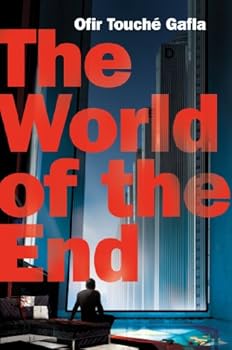
![]() The World of the End by Ofir Touché Gafla
The World of the End by Ofir Touché Gafla
The World of the End, by Ofir Touché Gafla is one of those post-death stories where much of the plot takes place in an after-life of some sort (think Hungry Bones, Defending Your Life, The Brief History of the Dead, etc.). Generally, I find these sort of explorations pretty intriguing, partially because I like seeing what sort of strange take on the afterlife authors come up and partially because I like the exploration of how people respond to a new “life” once the old one has passed. Often, the dead don’t give up their old life easily, and that’s the case here as well. In fact, the reason our main character, Ben Mendelsshon, ends up in this “Other World” is so he can regain his old life: a year after his wife Marian dies he kills himself in order to either be with her again (there is an afterlife) or not suffer her absence (there is no afterlife). As one might expect, things go a bit awry.
The big problem is that Ben can’t find his wife, once he arrives at the Other World, goes through their brief (too brief) orientation, and finds his apartment (you’re assigned a living spot dependent on the year and time of your death). To help, he employs the services of a private investigator and the two of them start tracking down people she might have gotten together with and places in the Other World she might have gone to (an amusement park, a rock concert where all the performers died too young, such as Hendrix and Joplin). Gafla interweaves the storyline set in the Other World with a few other stories set in our world dealing with: an “Angel of Death” nurse, a crusty old artist in a coma, a pedophile and his brother, a pair of Rushdie fans who start an online romance, a couple who can’t have children, and a few others. At first many of these storylines seem completely separate or only tangentially attached, but eventually Gafla brings them all together. Whether he does so successfully or not is another question.
Since much of The World of the End is a mystery, or several of them — where is Marian, who is this mysterious person in a photograph, who are these Rushdie fans — I don’t want to go into too much detail. But in general times, from my viewpoint, things just got too convoluted, too out there, too contrived, too implausible and then, to make things worse, employed an age-old cliché that one could see coming a mile away.
Just to give one specific example that won’t spoil much plot, there is a running gag where Ben doesn’t tell his PI (Mad Hop) a piece of information. This screws up the investigation, Mad Hop cusses out Ben and calls him an idiot, investigates again with the new info, and then it happens again. And again. The problem isn’t the repetition; it’s the arbitrariness of it all. The first time is when Ben doesn’t say anything about dead family members and Mad Hop explains that maybe Marian might have gone to see someone she knew in the old world. That seems such an obvious concept that it’s pretty hard to imagine Ben not thinking of it himself. Another time, there is no reason for Ben to have told the PI the information since only someone who knows this Other World well would have known it to be important. At no time does the PI ever actually try to fully explain the world, fully explain what might be important, or ask Ben questions to ascertain information that he knows (but Ben does not) might be important. In other words, neither character acts believably; they both do something implausible so as to advance the plot. And do so multiple times.
I also found the Other World to be a bit thin and also a bit arbitrary. Everyone in the Other World is nude, and while there’s a nod to an explanation, it doesn’t really feel like enough, and people seem to have adjusted far too easily. Why are they using videotapes? Why the restriction on moving? There are several aspects that are nicely original, but just as one feels they’re settling down into just accepting this world as presented, another little nagging item pops up.
That’s pretty much how I felt about The World of the End as a whole. I like a lot of what Gafla is doing here: exploring the question of romance and love (what does “love” mean if one has an eternity?), tracing the ways people’s lives intersect and have an effect even if nobody is aware of that intersection, how would one respond if one has no negative impact from one’s vices? I also like the way absurdity and surrealism thread throughout. But too often the book veered off the tracks due to one of two things: the story got out of Gafla’s control and thus felt too random, too arbitrary or the story felt too much in Gafla’s control and thus felt too contrived. Eventually, The World of the End sank under the weight of both issues, meaning I liked it better at the start than the end, and finished it with an overall sense of dissatisfaction.



Wow, I'm really impressed by the 15- and 20-year old owning and running their own bookstores! I loved books as…
There were two interesting articles about publishing that I ran across, the first via a link in the second: No…
My pleasure, Robin! And yes, it surely is some kind of an experience, to be sure....
Thanks for the solution to a mystery many decades old. One of my favourite novels, this. Hilariously funny, completely unpredictable,…
Thank you. I’m all caught up. Back to reading Crimson Embers.